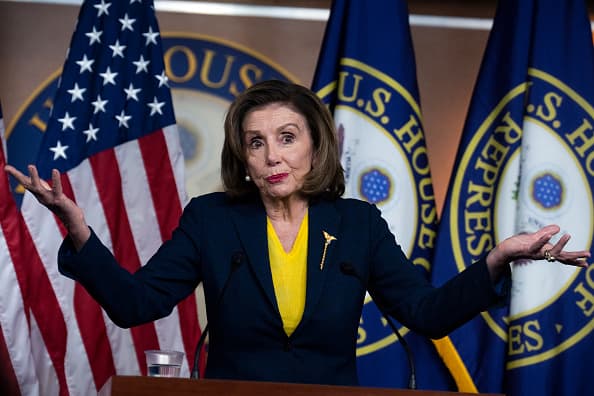
Speaker of the House Nancy Pelosi holds her weekly news conference in the Capitol Visitor Center.
Nancy Pelosi doesn't like the idea of banning congressional lawmakers and their spouses from owning stock shares of individual companies because of the potential for conflicts of interest.
At a press conference, Pelosi was asked if she would support a prohibition.
She said that the economy is a free-market one. They should be able to participate.
A question about a Business Insider investigative report on stock ownership by lawmakers and the controversy over stock purchases by a number of senators caused Pelosi to dismiss the idea of a stock-purchase ban.
The Business Insider series found that 49 members of Congress and 182 senior-level congressional staffers had violated the so-called STOCK Act, which requires the public disclosure by themselves and family members within 45 days of sales or purchases of individual stocks, bonds and commodity futures.
The Stop Trading on Congressional Knowledge Act was enacted in 2012 to prevent lawmakers and staffers from engaging in trading on information they glean from their jobs.
The fines for violating the STOCK Act are usually just $200.
Pelosi said that they have a responsibility to report stock trades.
The speaker was not familiar with the findings of the series.
If people aren't reporting stock trades, they should be.
The Securities and Exchange Commission Chairman called for tougher rules on stock trading by corporate executives.
The Federal Reserve banned officials of that central bank from owning individual stocks and bonds.
The resignations of two Federal Reserve regional presidents, Robert Kaplan of Dallas and Eric Rosengren of Boston, came after disclosures that they had traded individual securities in 2020. The Fed was engaged in massive purchases of assets aimed at keeping markets stable as the coronaviruses ravaged markets.
A number of good-government groups and some lawmakers have called for a ban on owning stocks, or mandating that members of Congress put their financial holdings in a blind trust while they are in office.
One way to allow lawmakers to get investment returns while limiting the potential for benefiting from information they obtain about individual companies is to allow them to own index funds.
In 2019. Chris Collins pleaded guilty to federal charges related to tipping off his son about non-public information he had obtained about a pharmaceutical company's failed drug trial, shortly before public disclosure of that information sent the company's stock into a tailspin.
Collins served on the board of directors of the company even as he was in Congress.
Innate had Collins as its biggest shareholder in the early part of 2016 with more than 17 percent of the firm. His children were the third and fourth largest shareholders, with each owning 2.65 percent of the company, or 5.2 million shares.
Collins was pardoned by President Donald Trump in December of 2020. Collins was the first member of Congress to endorse Trump.
Last year, federal prosecutors investigated stock sales made in advance of a market plunge by Sen. Richard Burr, R-N.C. Both Kelly and Dianne are from Georgia.
There were no criminal charges being filed.
The Securities and Exchange Commission is looking into whether Burr and his brother-in-law Gerald Fauth and Fauth's wife traded on non-public information that he obtained about Covid. The National Mediation Board is an agency that facilitates labor-management relations in the U.S. railroad and airline industries.
In August, Sen. Paul revealed that his wife Kelly had bought shares of the drug company in early 2020 one day after the first US clinical trial began for remdesivir as a treatment.
Paul and his wife have never bought stock in an individual company.
The legal deadline for reporting it under the STOCK Act was passed more than 16 months ago.
Between January and May, Sen. Tommy Tuberville disclosed stock and stock option trades valued at between $894,000 and $3.5 million.
Tuberville made his disclosure after the deadline expired.
